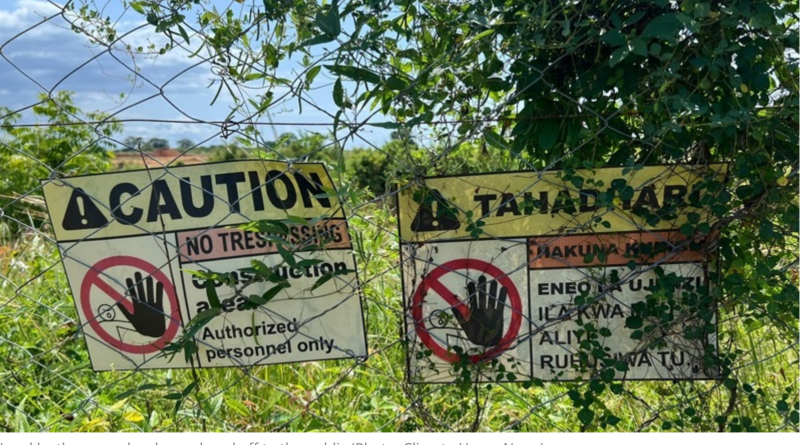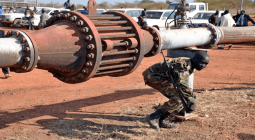Where East African oil pipeline meets sea, displaced farmers bemoan “bad deal” on compensation

The serene coastline of Chongoleani used to be a little-known paradise for local fishers and farmers just north of the Tanzanian city of Tanga.
But now it is becoming the end-point for the East African Crude Oil Pipeline (EACOP) where, after a journey of over 1,400 km through Uganda and Tanzania, the oil is stored and put onto ships bound for customers abroad.
EACOP is a joint venture between French multinational TotalEnergies, the China National Offshore Oil Corporation and the governments of Uganda and Tanzania. It plans to bring oil from the Tilenga and Kingfisher oil fields near Uganda’s Lake Albert, down past Lake Victoria and all the way east through Tanzania to the Chongoleani Peninsula.
While the $4-billion project promises economic growth and energy security for the region, it has sparked protests due to its negative environmental, economic and social impacts – which have been met by crackdowns on the part of the authorities in both countries.
East African climate activists have joined forces with their international counterparts in a campaign called #StopEACOP, arguing that the pipeline will exacerbate climate change by transporting 246,000 barrels of oil a day to customers to burn, releasing greenhouse gases. They also warn that it will displace thousands of people and endangers water resources, wetlands, nature reserves and wildlife.
The Ugandan government says that it has the right to exploit the country’s fossil fuel resources in order to fund much-needed economic development and is taking measures to reduce the project’s climate impact, such as heating the pipeline with solar energy. Wealthy nations like the US, Canada and Australia, meanwhile, are also increasing fossil fuel production.
Living “like town dwellers”
In Tanzania, Chongoleani residents said they had been warned by the village chairman and other ward leaders not to talk to journalists, but Climate Home spoke to two whose land had been taken over by the government for the pipeline and its port.
Without adequate compensation, they said they had been unable to buy a new farm in the area and have to buy food from the city rather than growing their own and selling the surplus.
Mustafa Mohammed Mustafa said his family used to own two farms in Kigomeni village, together about as big as eight football pitches. On these, they grew coconut, cassava, corn and groundnuts. They ate some of it and sold the rest.
But with the pipeline coming, the government-owned Tanzania Ports Authority took over their land, compensating them with 15m Tanzanian shillings ($5,700), which hasn’t been enough for them to buy new farmland in the area.
“We live like town dwellers these days,” said Mustafa. “We buy firewood, we buy charcoal, we buy lemons, coconut, cassava. We buy all of these supplies from the city centre. How is this alright?”
House prices soar
Part of the reason they cannot afford a farm, says Mustafa, is that EACOP’s arrival has increased the price of local land, as it is considered a project area with potential for business investment.
Villagers either put a high price on their land or hold onto it and only accept offers from the government or foreign investors, according to Mustafa, believing this will get them a better deal.
Mustafa blames the government for not giving them proper information from the initial stages of the project, nor a choice about whether they wanted to sell their property. Instead, he said, they were told that the project is of great economic importance for the country.
“I am angry that the government took advantage of our ignorance of legal matters and gave us a bad deal that we couldn’t argue against,” Mustafa said.
Sitting alongside Mustafa in Chongoleani village, Mdiri Akida Sharifu said he regrets selling his family’s land in Kigomeni but they had no other option.
“At the moment, we have very little faith that this will benefit us. When government officials came here, they encouraged us to give up our land with the promise that once the project started, we would be given priority in getting jobs. But now that we’ve given up our land, we even have to buy lemons from Tanga town,” he said.
Countrywide compensation battles
Elsewhere along the pipeline’s routes, landowners have complained about unfair compensation, saying the government paid them in 2023 using price estimates made in 2016, ignoring seven years of inflation. Kamili Fabian from the Manyara region told local paper Mwananchi that he was paid less than a third of his land’s value. “Where is the justice in that?” he asked.
The government says it uses national and international standards to compensate people fairly. Energy minister Doto Biteko has said 35bn shillings ($13m) had been allocated for this purpose and the government had built 340 new homes for relocated people.
Reporting on these issues is a challenge. When Climate Home visited the coastal village of Putini, a man called Mahimbo – who would only give one name – refused to comment on the compensation process and said local leaders had told the villagers not to speak to journalists about the pipeline.
But he took Climate Home to the office of village chairperson Abdallah Said Kanuni to seek permission to comment on the record. “We have been given clear instructions to neither speak with journalists nor allow them to interview villagers on matters relating to the pipeline, unless the journalists have official permits from the regional [government] office,” Kanuni said.
Compensation battles are playing out far beyond this area. A Total spokesperson told Climate Home nearly 19,000 households have been compensated for the effects of the pipeline and the associated Tilenga oil field on them and about 750 replacement houses have been handed over.
But Diana Nabiruma, communications officer for the Africa Institute for Energy Governance (AFIEGO), said her organisation had spoken to hundreds of people who had received compensation and had yet to meet any that said it was adequate.
She said a major problem has been that people were paid in 2023 based on their land’s value in 2019. As in Chongoleani, the price of land rose in those four years, partly because of EACOP and the promise of paved roads. Many people have not been able to replace the property they lost, she said.
Nabiruma added that many people want to seek top-up compensation but are scared – and unable to afford – to challenge EACOP and the government in court. In Uganda’s capital Kampala, police have beaten and arrested activists protesting against the pipeline.
The Total spokesperson said EACOP will improve living conditions, adding that Total complies with local regulations and international standards and there is a fair grievance management mechanism in place for local people.
An EACOP spokesperson said that since last year, the project has provided households affected by leasing of their land in Chongoleani with food baskets and cash transfers, adding that the villagers are given preferential access to unskilled or semi-skilled work on the project.
The Tanzania Ports Authority did not respond to a request for comment.




